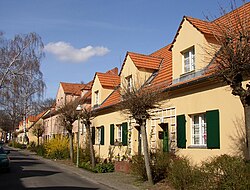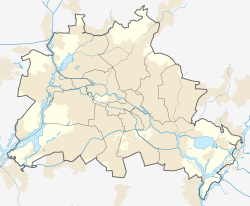Top Qs
Timeline
Chat
Perspective
Siemensstadt
Quarter of Berlin in Germany From Wikipedia, the free encyclopedia
Remove ads
Siemensstadt (German: [ˈziːmənsˌʃtat] ⓘ) is a locality (Ortsteil) of Berlin in the district (Bezirk) of Spandau.
Remove ads
History
The locality emerged when the company Siemens & Halske (S & H), one of the predecessors of today's Siemens, bought land in the area, in order to expand production of S & H and their subsidiary Siemens-Schuckertwerke (SSW) as well. On the initiative of Georg Wilhelm von Siemens, S & H started to build new factories in 1899. Soon also residential buildings were erected. The locality was incorporated into Berlin on 1 October 1920 by the Greater Berlin Act.
During World War II, Siemensstadt was the location of a subcamp of the Sachsenhausen concentration camp for men and women, mostly Hungarian Jews, but also Bulgarians, French, Italians, Yugoslavs, Dutch, Poles, Czechoslovaks, Russians and Ukrainians.[2]
Remove ads
Geography
Siemensstadt is situated on the eastern side of the Spandau district. It borders Spandau (locality), Haselhorst, Tegel (in Reinickendorf), Charlottenburg-Nord and Westend (both in Charlottenburg-Wilmersdorf). The Großsiedlung Siemensstadt is situated close to Siemensstadt but in Charlottenburg-Nord.
Transport
Siemensstadt is served by the Berliner U-Bahn line U7 at the stations of Paulsternstrasse, Rohrdamm and Siemensdamm.
Images
- Siemens-Tower
- Wernerwerk (Werner's Factory)
- Wernerwerk II
- Wernerwerk XV
- Rapsstrasse, northern part
- Rapsstrasse
- Christophorus Church
- Rohrdamm
- Genoveva-Fountain
- Rieppelstrasse
- Rieppel- Ecke Dihlmannstrasse
- Maeckeritzstrasse
See also
References
External links
Wikiwand - on
Seamless Wikipedia browsing. On steroids.
Remove ads
















